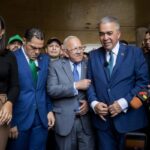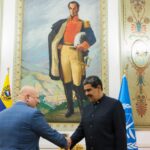
Opposition figures regularly speak their mind on talk shows and news programs in Venezuela, undermining the notion that freedom of the press is highly restricted, says Joe Emersberger.
Story Transcript
GREG WILPERT: Welcome to The Real News Network. I’m Greg Wilpert in Baltimore.
Venezuela spent the early months of this year almost constantly in the international media’s headlines. This was largely due to several attempts of the Venezuelan opposition to overthrow the government of president Nicolas Maduro. This opposition effort began when the opposition’s president of the National Assembly, Juan Guaido, declared himself to be president of Venezuela, and eventually 50 out of 200 countries around the world decided to recognize him as such.
This was followed with what now amounts to draconian U.S. economic sanctions against Venezuela. The sanctions halted all Venezuelan oil exports to the United States, once Venezuela’s largest market for oil, and is threatening all countries and companies with secondary sanctions if they do business with Venezuela. A large part of Guaido’s claim to the presidency, and why other countries decided to recognize it, rests on the argument that Maduro was not elected in free and fair elections in May of 2018. One of the bases for these claims is that there is limited press freedom in Venezuela.
Here at The Real News Network, we actually published a report recently which interviewed some Venezuelan journalists who echoed this claim. Here’s a short clip from this report in which the prominent Venezuelan journalist, Vanessa Davies, gives her perspective on the evolution of the Maduro government.
Joining me now to discuss the state of press freedom in Venezuela is Joe Emersberger. Joe is a writer who has been writing on Venezuela for fair.org, The Canary, CounterPunch and Telesur English. Thanks for joining us today, Joe.
JOE EMERSBERGER: Thank you very much.
GREG WILPERT: You have followed Venezuela news media for a while now. Let’s start with your reaction to what Vanessa Davies said in this clip just now, that there is a difference in press freedom between Chavez and Maduro, and that the press has become more and more restricted under Maduro. Do you see any evidence for this claim?
JOE EMERSBERGER: Yeah, there could be, but it’s not really relevant to the main point that people need to understand in countries like Canada and the United States. That’s that the Venezuelan media is remarkably free, especially when you consider the situation it’s under. You mentioned at the beginning the economic sanctions, but along with the economic sanctions, which has killed possibly tens of thousands, certainly thousands of people, if you look at the study that was done by Mark Weisbrot and Jeffrey Sachs, in addition to that, there’s also been repeated military threats. Trump has made these repeatedly, most recently threatening to naval blockade, that he’s considering a naval blockade of Venezuela.
A country under those conditions … I mean, if my country of Canada were under those conditions, I don’t think I’m going to see politicians who are openly allied with the country that’s threatening Canada and suffocating its economy, that they’re going to be walking around, and that their allies are going to be mentioned at all on TV media and private TV. That just wouldn’t happen. When you consider that, then actually Venezuelan media is remarkably free. The Western media has been telling us for basically two decades, but it’s really ramped up recently, that there’s basically zero freedom of expression, like you mentioned.
There’s one very illustrative article that was published by Time Magazine in April by Ciara Nugent. The headline of the article was like Venezuelans Are Starving for Information. The article features a picture of Venezuelan opposition activists on a bus, and they’re holding up a cardboard frame meant to symbolically represent a TV. The message that’s conveyed through this image and for the whole article is that basically the TV media really has no content whatsoever that the Maduro government doesn’t want people to know, and that there’s no real way to learn about what’s going on in the country, the political and economic crisis, and that activists are basically reduced to these pitiful tactics of having to go on public transit and try to inform people that way. What I did is, recently, I put on my ZNet blog, I did a minute by minute summary of a newscast on Venevision. And that’s one of the biggest private networks in Venezuela.
Now, it’s important to note, the Maduro government tells the media regulators, they claim that about 60% of Venezuelans have some kind of paid satellite or cable TV access. But actually I spoke to an opposition person who says that, according to an opposition pollster, he told me that actually, when you consider unpaid subscriptions to private media, it actually could be as high as 87.7%. Now I think that’s probably high, because I think these opposition pollsters skew towards people who would be most eager to want that kind of access to that kind of media. But still, it’s got to be somewhere between 60% to 87%, somewhere in that neighborhood, the percentage of households in Venezuela that have some kind, legal or otherwise, access to these private media broadcasts.
If you believe an article like this Time Magazine one I just mentioned, then when you looked at a private network newscast, you’d expect to see basically nothing but the government, nothing but good news, and if there’s any bad news, just blaming it all on somebody else, the U.S. or whatever. I’ll try to just really go over quickly what I find when I summarize the newscasts. It starts off with images, you can see right off the bat, of Donald Trump and Juan Guaido and Colombia’s foreign minister and all these people who hate Maduro’s government. The newscast reports plans from UNICEF about the gravity of the economic crisis and the impact on child health.
The reporter says that more than one million Venezuelans are in Colombia and showed a clip of the Colombian minister asking for more money from the international community, because he says 111,000 Venezuelans have poured into the country over the last few months, and that there is now a total of 1.455 million Venezuelans in Colombia. The newscast reports that Brazil has banned Maduro’s officials from entering the country over alleged human rights abuses. It shows a video clip of a rancher in the state of Táchira, saying that fuel shortages and power outages have reduced milk production by 60% over the past two months. It shows an opposition parliamentarian saying in parliament that Maduro’s economic initiatives over the past year have been a total failure.
It shows Caracas residents saying that bus fares are being illegally raised at the same time that the real wages are being pulverized. It shows university students saying that their university had been without regular electricity or water for a year. It shows businessmen in Maracaibo City saying that their sales are down 70% over the past few months because of power outages. It also shows, at one point, a video clip of Juan Guaido saying, “There’s nothing wrong with me going to the United States and meeting with my allies,” because he recently sent people there to confer with U.S. officials. He also says, in his video clip, he says that he’s totally opposed to any kind of Russian military presence in Venezuela’s territorial waters.
All this being reported in this private network, and it reaches millions and millions of households in Venezuela. That is really remarkable when you think about the country that’s under this kind of sustained attack from the most powerful country on earth, that really says something. It also says a lot about how dishonest this Time Magazine article I just mentioned was, because anyone who read that article and believed it, there’s no way a newscast like this is possible.
RELATED CONTENT: Guaidó Abandons Cúcuta Defectors, Draws Anti-Chavista Criticism Abroad (Video)
GREG WILPERT: I think that’s a very important point that you’re making. Also the point of this one is to distinguish, it seems, also between private and public, the state owned media and private media, and that the coverage is obviously very different on the two. But one of the main arguments that has been made about the lack of press freedom of Venezuela center around three issues. That is, the regulation of the media, that is the rules. Recently, Human Rights Watch in its annual report … Actually no. It was a report actually from two years ago, I think, where they specifically mentioned that there was a lot of regulation that could be used to intimidate the media.
Then there is also the withdrawal of advertising, according to them, from media outlets that criticize the government. Then there’s also–and this was also mentioned in the report that we published–that there’s a lack of newsprint for critical newspapers.
Now, what role do you see these issues playing in Venezuela’s media landscape relative to the points that you just made?
JOE EMERSBERGER: Well, those are all criticisms you can make of any government on earth. Any democracy, any real world democracy contends with all those issues. They all have media regulators. We all have … Like Ofcom in the UK, for example, recently threatened George Galloway not to do overly one-sided interviews about this antisemitism smear campaign that Jeremy Corbyn, the head of the Labor Party’s being hit with. These kinds of regulators exist all over the world.
The problem of dependence on advertising to sustain media, obviously that’s a huge problem. That’s why we have these corporate outlets, huge corporate outlets that can constrain the kind of information people get. I just mentioned Time Magazine. Why is somebody able to publish something so incredibly dishonest in such a major outlet without any fear of being embarrassed by any kind of devastating rebuttal? Sure, we have outlets like The Real News. Alternative outlets exist. But when you look at big media outlets, there’s a big problem with the concentration of money and power and advertising dollars that skews the discussion.
Those are all issues that are important in a democracy. They’re issues in Venezuela as well, but that’s the point. It is a democracy. It has issues, limitations on press freedom, but that’s true all over the world. But what we’re being told by these people like Time Magazine, and it’s the New York Times, it’s everybody now, it’s ridiculous, is that Venezuela is a dictatorship. This kind of newscast I just described should not be possible anywhere on any scale. In fact, it is possible and it’s on a huge scale.
That’s what people need to understand is that it’s the limitations of our own democracies and our own media system that has allowed Venezuela to be smeared as a dictatorship and has allowed a real maniac like Trump to now escalate his economic and military press.
You mentioned Human Rights Watch. Those groups have … Just recently, Trump has continuously escalated his economic sanctions, along with his press. Only recently, his escalation has become so extreme that these big human rights groups like Human Rights Watch and Amnesty are very timidly, very, very inadequately said, “Okay, well, that’s going a little too far.” But in fact, these sanctions have been murderous since 2017.
GREG WILPERT: Well, I think that’s very important, the point that you’re making. They hardly even mention the sanctions, actually. I thought it was interesting that in their most recent report, they didn’t mention the sanctions at all–that is, their annual report–and then mentioned the restrictions on freedom of the press without giving that additional context, which as you stated in the beginning, seems pretty relevant.
I’m afraid we’re going to have to leave it there for now. I was speaking to Joe Emersberger, a freelance writer on Venezuela. Thanks again, Joe, for having joined us today.
JOE EMERSBERGER: Thanks for having me on, Greg. Thanks very much.
GREG WILPERT: And thank you for joining The Real News Network.
DHARNA NOOR: Hey, you all. My name is Dharna Noor. I’m a climate crisis reporter here at The Real News Network. This is a crucial moment for humanity and for the planet, so if you like what we do, please, please support us by subscribing at the link below. Thank you.
- orinocotribunehttps://orinocotribune.com/author/orinocotribune/
- orinocotribunehttps://orinocotribune.com/author/orinocotribune/April 23, 2024
- orinocotribunehttps://orinocotribune.com/author/orinocotribune/
- orinocotribunehttps://orinocotribune.com/author/orinocotribune/
Share this:
- Click to share on Twitter (Opens in new window)
- Click to share on Facebook (Opens in new window)
- Click to share on LinkedIn (Opens in new window)
- Click to share on WhatsApp (Opens in new window)
- Click to share on Reddit (Opens in new window)
- Click to share on Telegram (Opens in new window)
- Click to email a link to a friend (Opens in new window)





